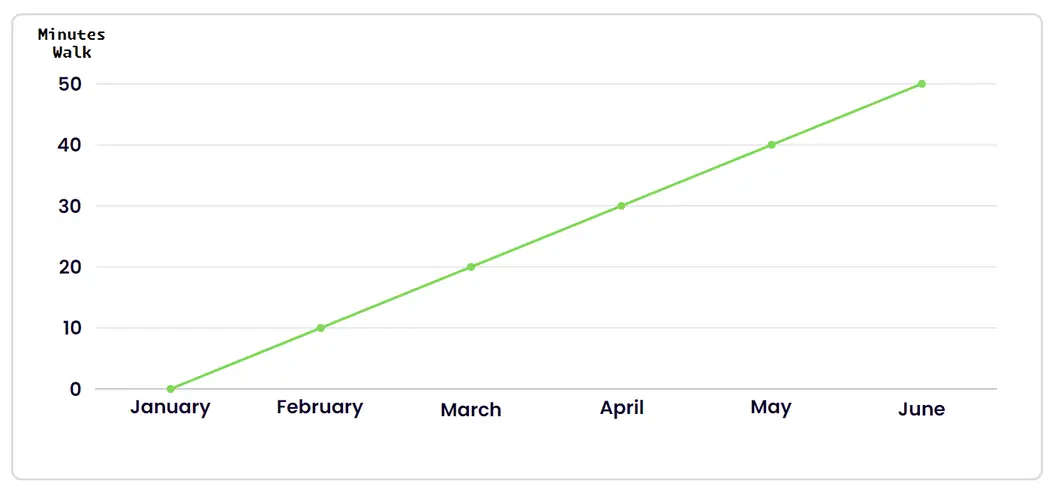Do you set goals, only to feel overwhelmed and quit before you even get started? You’re not alone! The big dreams feel just too far out of reach.
Changing your life takes more than just big ideas. It’s the small, consistent actions that take you where you want to go, but building new habits is HARD.
What if there was a straightforward method to create lasting habits that actually support your goals? In this article, you’ll discover a 5-step plan to set good habits and finally achieve the success you deserve.
How to Set Good Habits to Achieve a Goal in 5 Steps
The path to reaching your goals isn’t a single jump, it’s a series of carefully chosen steps. Building the right habits is like laying the foundation for your entire journey.
Let’s break down the process into 5 simple steps that will help you create habits designed to bring you success:
Step 1: Choose a Specific and Meaningful Goal
Before you get to habit building, the groundwork lies in having a crystal-clear goal. Vague goals like “Get healthy” or “Be happier” lack the focus needed for lasting change. It’s hard to develop habits if you don’t know exactly what you’re aiming for.
Instead, follow the SMART goal-setting model to make goals that are:
- Specific: What exactly do you want to achieve?
- Measurable: How will you know when you’ve reached it?
- Achievable: Is it a realistic goal given your resources?
- Relevant: Does your goal align with your larger values and desires?
- Time-bound: When do you want to achieve this goal?
Example: Instead of “Get healthy”, a SMART goal would be: “Lose 15 pounds in the next 4 months by exercising 4 days a week and focusing on a balanced diet.”
Step 2: Break it Down into Tiny Actions
Big goals can seem overwhelming, causing procrastination and analysis paralysis. The secret is to start small. So small it feels almost silly!
We’re talking about actions that barely feel like you’re getting anywhere – that’s the trick. Tiny actions take the fear and pressure out of starting.
Let’s take our SMART goal from earlier: “Lose 15 pounds in the next 4 months by exercising 4 days a week and focusing on a balanced diet.” Instead of tackling that entire goal at once, break it down:
- Exercise: Start with 10-minute walks three days a week.
- Diet: Replace your afternoon sugary snack with a piece of fruit.

That’s it! Simple enough to take action on, even on your lowest motivation days.
"If you miss one day, try to get back on track as quickly as possible"
 James Clear
James Clear Step 3: Link New Habits to Existing Ones
Trying to integrate brand-new habits into your life can be tough. You’re essentially fighting your brain’s autopilot! Habit stacking offers a workaround, making the task of habit creation so much smoother.
Think of it as piggybacking on the ingrained routines that already take up space in your life.
- Choose your new habit: What small action supports your bigger goal? Maybe it’s going for a quick walk during your lunch break, journaling for 10 minutes before bed, or studying a new skill for 20 minutes in the morning.
- Identify your trigger: Which daily habit is so automatic that you do it without much thought? Look for things like making your coffee, brushing your teeth, getting home from work, or setting your alarm at night.
- Stack them together! Commit to performing your new habit immediately after your chosen trigger. It might feel a bit forced at first, but over time the repetition will create a new neural pathway in your brain, making the process as automatic as your original trigger habit.
Struggling to think of existing habits? Don’t overcomplicate it! Simple options like drinking a glass of water in the morning, setting your clothes out the night before, or even waiting for the kettle to boil can be effective triggers for establishing new habits.
Step 4: Keep Track and Stay Motivated
It’s human nature to be motivated by a sense of progress. Tracking your habits serves two purposes: it keeps you accountable, and it makes your wins visible. Here are a few no-fuss strategies:
- Habit calendar: Get a simple wall calendar and cross off each day you successfully do your habit. Watching that chain of X’s grow is oddly satisfying!
- Habit tracker app: Tech-savvy? Choose one of the many habit-tracking apps available. Some even offer features like streak counters and reminders.
- The Paperclip Strategy: This classic technique requires two jars and a stack of paperclips. At the start of the day, your paperclips are in one jar. Each time you complete your habit, move one to the other jar. Seeing that visual shift at the end of the day is surprisingly motivating.
Beyond that, stay motivated by reminding yourself why you chose this goal in the first place. Keep this reason front and center – maybe it’s a note on your mirror, a vision board, or a mantra you repeat daily.
Step 5: Be Patient and Adjust as Needed
Building a habit that consistently supports your goal takes time. Just like a growing plant, there might be periods of faster progress and times where it feels like nothing is happening.
Also, it’s okay to adjust your approach. If your tiny action is no longer challenging, it’s time to level up. Maybe adding 5 minutes to your walk or switching up your morning fruit choice. Likewise, if the habit you chose feels too hard, make it even smaller until it feels easily achievable.
On average, it takes 66 days for a new behavior to become automatic. (Source: European Journal of Social Psychology)
Habits aren’t a “set it and forget it” deal. The most successful journeys involve revisiting your actions and tweaking them until you find that sweet spot where consistency feels smooth and your goals get closer with each little action.
Understanding the Good Habits for Goal Setting
We’ve covered how to get started with habit building, but which habits are most likely to fuel success with your goals?
Of course, some specifics will depend on your individual targets, but there are a few foundational habits that have a track record of supporting a wide range of dreams. We’ll explore those next!
Importance of Habits in Goal Setting
Think of goals as your destination and habits as the vehicle that gets you there. It’s possible to reach a goal through sheer willpower for a short period, but for lasting success, habits are what will carry you across the finish line and beyond.
Here’s why they matter so much:
- Habits build momentum: Consistent actions, no matter how small, generate results. Even slight but continuous improvement over time compounds into major accomplishments.
- Habits conserve mental energy: Willpower is a limited resource. Habits create automaticity—you no longer have to debate whether to act because the action has become ingrained.
- Habits become your identity: What you consistently do shapes who you believe yourself to be. If you prioritize healthy eating, fitness, or learning, those things become part of how you see yourself, bolstering your ability to keep acting in alignment with your goals.
Habits Better than Motivation
We often think motivation is the magic ingredient for achieving success. While a burst of excitement can help in the initial stages, true progress depends on consistent action.
This is where habits become your super power, outlasting bursts of motivation and propelling you towards your goals.
| Characteristic | Habit | Motivation |
|---|---|---|
| Consistency | High - Habits become automatic after repetition. | Variable - Motivation can fluctuate depending on mood, energy levels, and circumstances. |
| Effort required | Low - Once established, habits require minimal effort to maintain. | High - Maintaining motivation often requires significant effort. |
| Sustainability | High - Habits can be sustained over long periods of time. | Low - Motivation can be fleeting and difficult to sustain. |
| Impact on identity | Positive - Habits shape your identity and self-belief. | Neutral - Motivation doesn’t directly influence identity. |
| Vulnerability to external factors | Low - Habits are less affected by external circumstances. | High - Motivation is easily swayed by external factors like setbacks or distractions. |
As you can see, habits have several advantages over motivation when it comes to achieving your goals. They are more consistent, require less effort, and are more sustainable in the long term.
”People who explicitly state that they are motivated to complete a task often have much lower completion rates than those who have integrated these actions into habits and complete them without thinking.”
Additionally, habits can have a positive impact on your identity and make you less vulnerable to external factors.
Maintain an Habit on Your Goal Setting Journey
Building a habit is one thing, but it’s keeping it alive that leads to the transformation you’re chasing. Here are some key tips to stay the course:
- Reward Yourself: A little dopamine hit goes a long way! Link rewards directly to completing your chosen habit. It doesn’t need to be elaborate – maybe a few minutes with a favorite video game, a luxurious bath, or simply a big checkmark on that habit calendar. This trains your brain to crave the activity you’re trying to solidify.
- Find an Accountability Partner: Share your goals and habit choices with a trusted friend or family member. Checking in with someone other than yourself adds a layer of motivation and support during moments of weakness.
- Don’t Give Up After Slip-ups: Perfection is the enemy of progress! Nobody does their habit 100% of the time. If you miss a day, simply pick back up as soon as you can. “All or nothing” thinking gets you nowhere.
- Celebrate your Progress: Acknowledging milestones on your journey, no matter how small, maintains the enthusiasm needed to keep moving forward. Remember, it’s all about small actions consistently taken, not overnight miracles.
Keep in mind: Building a habit that sticks can take anywhere from a few weeks to a few months. Stay patient, be kind to yourself, and watch your efforts compound into impressive results!
Obstacles and Strategies on Building an Good Habit
Obstacles
Even with the best of intentions, the path to a new habit is rarely smooth sailing. Understanding the common bumps in the road helps you anticipate them and have strategies in place to stay on track.
Let’s explore some of the biggest obstacles to habit formation:
- Lack of time: Life gets busy! It’s easy to put building new habits on the back burner when your schedule feels jam-packed.
- Lack of willpower: Even when you find the time, sometimes you just don’t feel like it. Willpower fluctuates, making it easy to ditch your commitment when motivation runs low.
- Procrastination: The siren song of your comfy couch or endless YouTube scrolling may call louder than your chosen habit. Procrastination is a big hurdle when the action you’re taking doesn’t have immediate satisfaction built-in.
- Unrealistic expectations: If you envision building a habit as a rapid, perfectly linear process, disappointment is inevitable. The reality is messier. Setting overly ambitious goals sets you up to feel like a failure when you don’t hit those marks every day.
Strategies
It’s one thing to know the obstacles that get in the way of habit formation, but it’s another thing entirely to have actionable strategies to overcome them
Let’s break down some effective solutions to those commonly faced roadblocks:
- Tackling the “no time” excuse: Remember those tiny actions from Step 2? This is where they shine! Habits don’t require large chunks of your day. Can you find 5 minutes during a work break, while dinner cooks, or before the rest of your family wakes up? Be relentless in carving out these mini-pockets of time.
- Willpower woes: Make the action so easy you can’t say no. If you struggle to hit the gym, put on your workout clothes as soon as you wake up. It increases the likelihood that one action will lead to the next. Also, don’t try to overhaul your entire life at once – focus on just one new habit at a time to conserve willpower.
- Battling procrastination: Create visual cues. Leave your yoga mat out, have pre-portioned healthy snacks waiting within sight, or keep your study materials on the kitchen table. Making your chosen habit obvious increases the chances you’ll follow through. Also, setting a timer for just 5 or 10 minutes makes starting feel less intimidating.
- Realistic expectations: Instead of focusing on the amount of change you want each day, track your consistency. Did you complete your planned habit? It doesn’t matter if it wasn’t your best session ever – showing up repeatedly is far more important early on.
Additional Tip: When all else fails, re-evaluate. Is this truly a habit directly supporting your goal? Does it make you feel good about yourself? Sometimes, abandoning a habit you realize isn’t a good fit is the most powerful strategy!
Case Study using Habits to Achieving a Big Goal
Maggie, a recent graduate with a passion for tech and social media, knew she wanted to break into the exciting world of digital marketing.

However, her busy schedule and lack of previous experience created self-doubt. After reading a blog post much like this one, Maggie decided to take a strategic, habit-focused approach to learn this new skill set. Here’s what she did:
1. Choose a Specific and Meaningful Goal
Maggie has this one figured out: “To gain entry-level knowledge of digital marketing sufficient for finding a job within six months.” It’s SMART – specific, measurable, achievable, relevant, and time-bound.
2. Break it Down into Tiny Actions
This is where it gets crucial for Maggie to address information overload.
- Enroll in one course on a specific area of digital marketing (i.e., “SEO Foundations”) and commit to 20 minutes of study per day.
- Identify 2-3 digital marketing blogs relevant to her interests and read one article from each blog daily.
- Brainstorm social media post ideas, practicing copywriting and brand voice for 15 minutes each morning.
3. Link New Habits to Existing Ones
- Maggie could study after her first cup of coffee in the morning before distractions set in.
- Reading marketing blogs can be done during her commute or lunch break.
- Brainstorming becomes a warm-up activity before diving into other work tasks.
4. Keep Track and Stay Motivated
Maggie will benefit heavily from a visual habit tracker to see her consistency – this combats doubt about how much she’s truly learning.
Consider rewarding herself at weekly milestones (a nice bookmark, fun socks, etc.). Finding an online forum for newbie marketers could provide camaraderie for extra motivation.
5. Be Patient and Adjust as Needed
Maggie must remind herself that big knowledge comes from the accumulation of small actions. If her SEO course turns out to be too advanced, don’t lose momentum!
Swap it with a truly basic option and revisit more difficult material later.
Results
After five months of diligent consistency, Maggie had a basic but growing understanding of digital marketing terms and strategies.
She built a small portfolio of sample social media campaigns and a personal website to showcase her work. This combined effort opened opportunities, and just within her six-month goal, Maggie landed an exciting internship!
Maggie’s story is a reminder that learning a new skill is achievable with consistency. By breaking down a big goal into bite-sized actions, building knowledge incrementally, and staying motivated through tracking, real progress towards mastery becomes possible.
Conclusion
Building good habits isn’t a sprint; it’s a marathon. The most important thing is simply to start and be willing to adjust as you go. Consistent effort, even in small ways, is what compounds to create amazing changes.
It’s not about being perfect – it’s about progress.
Next Steps
Now that you understand the process, here’s what you can do:
- Start Small: Pick one habit you’d like to build that supports a larger goal.
- Use the 5-Step Process: Go through the steps outlined in the article to create a solid foundation for your new habit.
- Seek Support: Share your goal and new habit with a friend or family member – accountability helps!
Frequently Asked Questions
How do you develop good habits?
Start small! Choose one tiny action related to your goal. Link it to an existing habit (like brushing your teeth) to act as a trigger. Track your progress to stay motivated, and be patient as you make adjustments along the way.
What is the 21 90 rule?
The 21/90 rule suggests it takes 21 days to form a habit and 90 days to make it a permanent lifestyle change. While not a hard-and-fast rule, it emphasizes the need for consistency in building new behaviors.
How to create a routine?
Start by identifying your most important tasks for the day. Schedule them at specific times, even if it’s just for 15-minute blocks. Leave room for flexibility and try batching similar tasks for better focus.
Why can’t I form habits?
There could be a few reasons: your goals might be too vague, your chosen habit too big, or you lack a clear ‘why’ behind your motivation. You might also be relying too much on willpower instead of creating systems for success.
Why is it so hard to create good habits?
Our brains are wired to favor the familiar, even if those habits aren’t good for us! Change requires conscious effort, which can be mentally tiring. It’s also easy to get discouraged when you don’t see immediate results.




